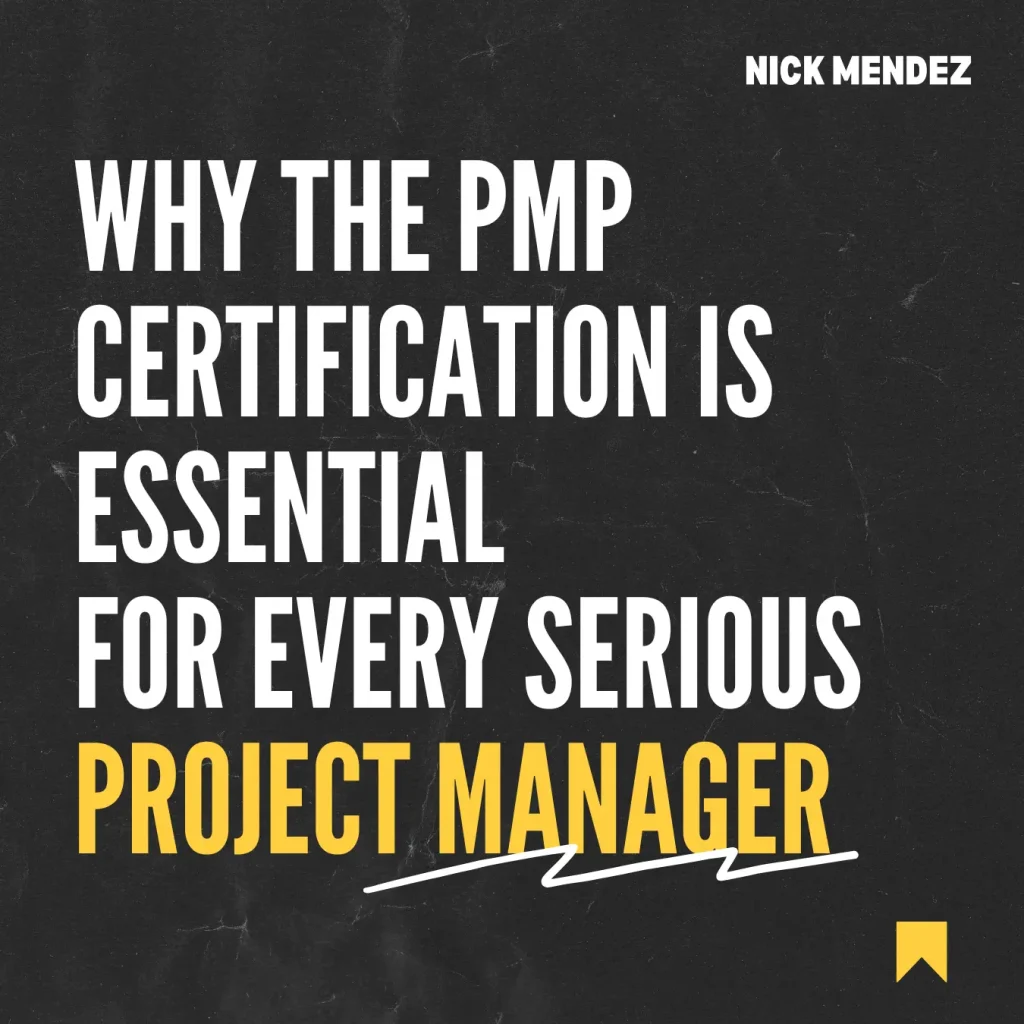Why the PMP Certification is Essential for Every Serious Project Manager
Table of Contents

About the Author – About Nicholas Mendez (Nick Mendez):
Nicholas Mendez (Nick Mendez) is a 26-year-old tech professional with 5+ years of cyber security, and technology project management experience. He earned his PMP certification on April 30, 2023, marking a significant milestone in his career. Since then, he’s written many guest posts and blog posts where readers have received a great amount of value and knowledge to prepare for their PMP exam.
Check out his FREE exclusive top-notch PMP study resources at nickmendez.co and his upcoming website teachmeit.co and get ready to take your career to the next level!

In the ever-evolving landscape of project management, the Project Management Professional (PMP) certification has emerged as a hallmark of excellence and a pivotal asset for aspiring and seasoned project managers alike. To further explore why obtaining the PMP certification is crucial for project managers aiming for success, it is important to consider the significance of the certification in today’s competitive professional arena and the benefits it offers.
Understanding the PMP Certification
The Project Management Professional (PMP) certification is a globally recognized credential that validates an individual’s expertise in project management. It holds immense significance in the project management field as it signifies mastery of project management principles, techniques, and best practices.
Roles and responsibilities of a project manager play a critical role in achieving these certifications and implementing them effectively.
To obtain the PMP certification, candidates must meet certain eligibility criteria, including a minimum of 4,500 hours of leading and directing projects and 35 hours of project management education. The certification exam consists of 180 multiple-choice questions covering various aspects of project management, such as initiating, planning, executing, monitoring and controlling, and closing projects.
Successful candidates demonstrate their ability to apply project management knowledge in real-world scenarios, making the PMP certification a testament to their competence and proficiency in the field. This prestigious certification not only validates their skills but also enhances their career prospects and professional credibility.
Benefits of the PMP Certification
Becoming a certified Project Management Professional (PMP) offers a multitude of advantages that extend far beyond the realm of project management. First off, becoming certified as a PMP validates one’s competence and experience with project management techniques and practices, which raises one’s profile in the industry. Individuals can take on more challenging projects and leadership roles, grow in their careers, and advance with a PMP certification.
Certified PMPs often experience a significant increase in earning potential, as their recognized expertise commands higher salaries and positions. These benefits are exemplified through numerous case studies and testimonials from PMP-certified professionals, who attest to the real-world advantages and opportunities that the certification has afforded them in their careers, solidifying its value and importance in the project management landscape.
PMP Exam Preparation
The PMP exam, structured to assess a candidate’s knowledge and application of project management principles, consists of 180 multiple-choice questions covering various content domains such as initiating, planning, executing, monitoring and controlling, and closing projects. To excel in the exam, candidates can utilize a variety of study resources, including official PMI materials, textbooks, online courses, and practice exams.
Effective PMP exam preparation involves developing a structured study plan tailored to individual learning styles and schedules, allocating sufficient time to review each content domain thoroughly. Engaging in practice exams helps familiarize candidates with the exam format and identify areas for improvement while employing exam-taking techniques such as time management and process of elimination enhances overall performance. By adopting these tips and strategies, aspiring PMPs can confidently prepare for and succeed in the rigorous PMP certification exam.
Career Opportunities with PMP Certification
The attainment of a PMP certification serves as a gateway to a diverse array of career opportunities in project management across various industries. PMP-certified professionals are highly sought after in sectors such as IT, where they play vital roles in overseeing complex software development projects and implementing technological innovations.
In the construction industry, PMP-certified individuals excel in managing large-scale construction projects, ensuring timely completion and adherence to budgetary constraints. Healthcare organizations value PMP certification for its ability to navigate regulatory requirements and execute critical projects aimed at improving patient care and operational efficiency.
Likewise, PMP-certified experts play a critical role in driving strategic initiatives, managing financial projects, mergers, and acquisitions, and optimizing returns on investments in the finance industry. Across these industries and beyond, the PMP certification unlocks opportunities for career advancement and positions individuals as indispensable assets in the dynamic field of project management.
Maintaining PMP Certification
Maintaining PMP certification requires adherence to certain requirements to ensure that certified professionals remain current and competent in the field of project management. One such requirement is the completion of continuing education and professional development activities, which typically involve earning Professional Development Units (PDUs) through activities such as attending training courses, participating in webinars, or contributing to the project management community.
To be successful in your career as a certified PMP, you must also stay up to date on industry trends and best practices. This can be achieved by regularly reading industry publications, participating in professional networking events, and joining relevant professional organizations or forums. By prioritizing continuing education and staying informed about emerging trends, certified PMPs can maintain their expertise, adapt to evolving industry standards, and continue to excel in their project management careers.
Wrap Up
The Project Management Professional (PMP) certification stands as an important credential for project managers, underscoring their expertise and proficiency in the field of project management. It offers a multitude of benefits, including enhanced credibility, increased career advancement opportunities, and greater earning potential.
Aspiring project managers are encouraged to pursue PMP certification as it provides a pathway to professional growth and advancement. By obtaining this certification, individuals not only validate their skills but also position themselves as highly valuable assets in the competitive job market. Embracing the journey towards PMP certification opens doors to a world of opportunities, empowering individuals to achieve their career aspirations and excel in the dynamic field of project management.
